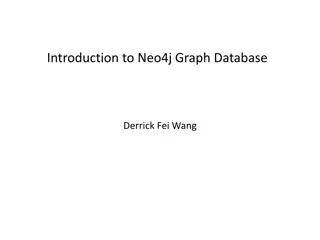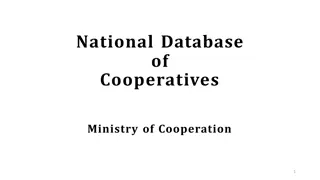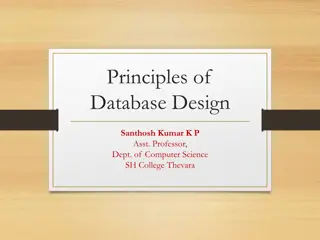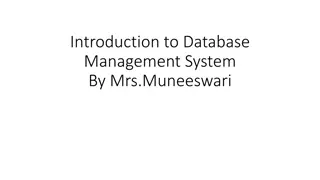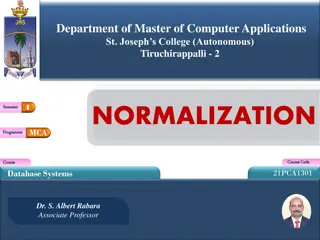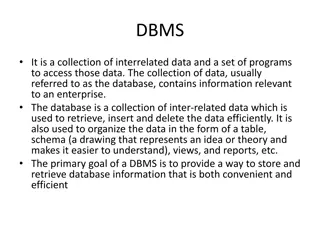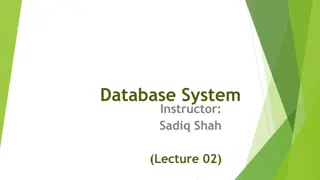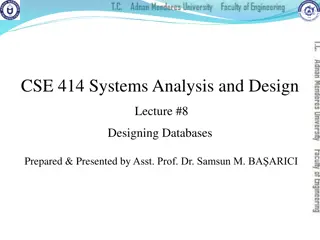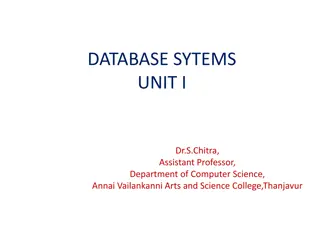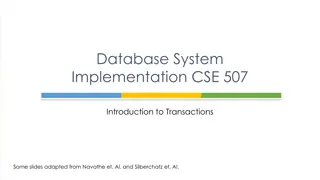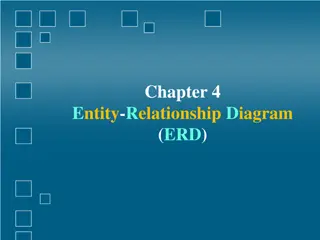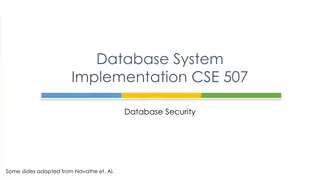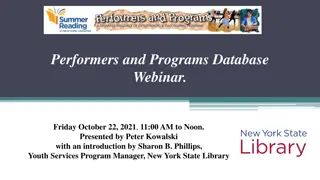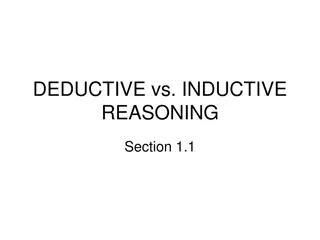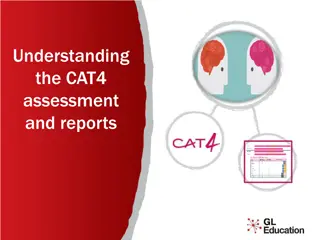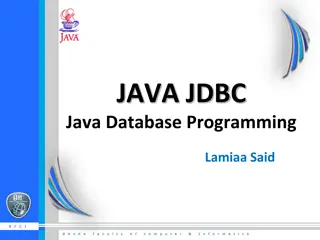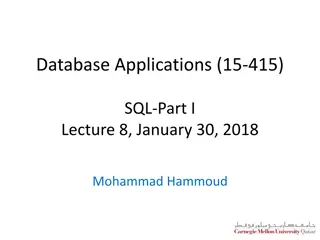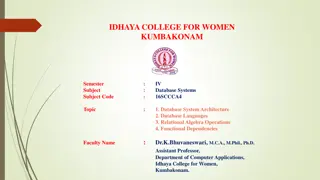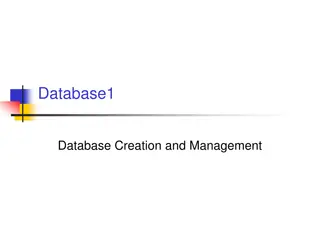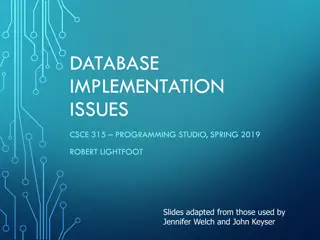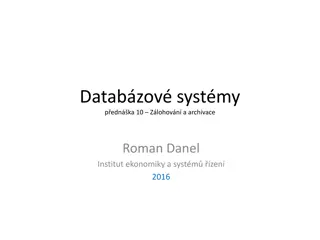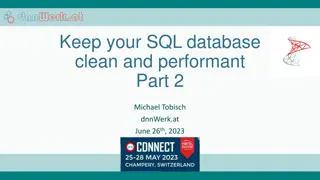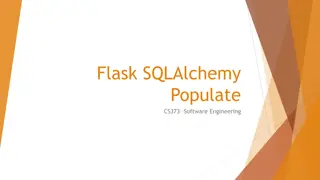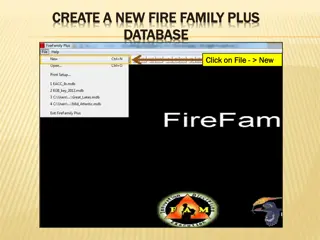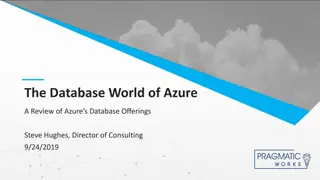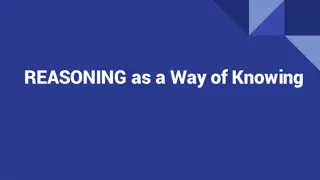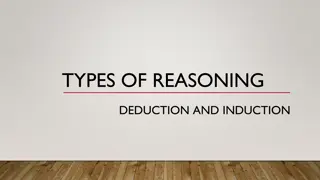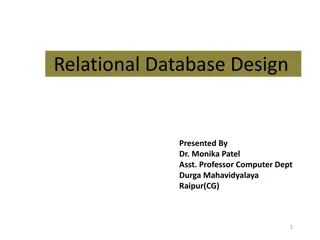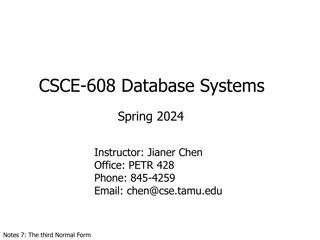Understanding Inductive and Deductive Reasoning
Inductive reasoning involves drawing general conclusions from specific observations, while deductive reasoning starts with general premises to derive specific conclusions. Induction uses experience or experimental evidence to make broad conclusions, while deduction follows from general to specific.
5 views • 7 slides
Understanding Neo4j Graph Database Fundamentals
This comprehensive presentation delves into the fundamentals of Neo4j graph database, covering topics such as the definition of graph databases, reasons for their usage, insights into Neo4j and Cypher, practical applications like data flow analysis, and hands-on instructions on creating and querying
0 views • 20 slides
National Database of Cooperatives: Ministry of Cooperation Initiatives
The Ministry of Cooperation is developing a National Database of Cooperatives to enhance transparency, governance, and policymaking in the cooperative sector. The database aims to provide comprehensive information on cooperatives across sectors, improve coordination among stakeholders, and facilitat
0 views • 22 slides
Database Design Principles and Management Overview
This document presents an overview of database design principles, including structured, semi-structured, and unstructured data types. It delves into the role of Database Management Systems (DBMS) in defining, constructing, manipulating, and sharing databases effectively. It also covers various types
0 views • 47 slides
Introduction to Database Management System Explained
This presentation covers the basics of database management systems, including definitions of data, types of data, structured and unstructured data, storing data in computers using file systems and database systems, and issues with file systems like data redundancy, inconsistency, difficult data acce
1 views • 18 slides
Understanding Database Normalization and Functional Dependencies
Database normalization is a crucial process that aims to improve database design by organizing data into higher forms of normality. This helps in reducing redundancy and ensuring data integrity. Functional dependencies play a key role in defining relationships between attributes in a database. By un
0 views • 33 slides
Oracle 19c Standard Edition: RAC Migration and Database Solutions Overview
Explore the implications of Oracle Database 19c Standard Edition no longer supporting RAC, and learn about disaster recovery and high availability options for users. Delve into the differences between HA and DR, along with the significance of workload isolation and scalability in database management
3 views • 22 slides
Understanding Database Management Systems (DBMS)
A Database Management System (DBMS) is a crucial tool for organizing, storing, and managing data efficiently. It allows users to create, update, retrieve, and delete data effectively, ensuring data consistency and security. DBMS software like MySQL and Oracle provide interfaces for various database
0 views • 21 slides
Costs and Risks of Implementing a Database Approach
Implementing a database approach involves additional costs and risks that need to be managed effectively. From hiring specialized personnel to dealing with conversion costs and organizational conflicts, organizations must carefully consider the implications of transitioning to a database system. The
0 views • 10 slides
Database Design Process and Concepts
This lecture on designing databases covers the database design process, normalization, transforming E-R diagrams, physical database design concepts, and steps in logical database modeling. It highlights the importance of logical and physical database design in system development, providing insights
0 views • 64 slides
Understanding Entity-Relationship Model in Database Systems
This article explores the Entity-Relationship (ER) model in database systems, covering topics like database design, ER model components, entities, attributes, key attributes, composite attributes, and multivalued attributes. The ER model provides a high-level data model to define data elements and r
0 views • 25 slides
Understanding Database Systems in IT
Database systems play a crucial role in managing and organizing data efficiently. They provide a structured environment for storing and accessing information, enabling various applications in sectors like banking, airlines, universities, sales, and more. The transition from traditional file systems
3 views • 38 slides
Understanding Properties of Database Transactions
Database transactions play a crucial role in ensuring data integrity and consistency within a database system. This content explores the fundamental properties of transactions, such as atomicity, durability, consistency, and isolation. It delves into the requirements and implications of each propert
2 views • 44 slides
Understanding Entity-Relationship Diagrams (ERD) for Database Design
Entity-Relationship Diagrams (ERD) are vital in database design, illustrating entities and their relationships. They help in conceptualizing data models and laying the groundwork for database structures. The process involves identifying entities, defining relationships, and analyzing interactions to
0 views • 40 slides
Database Security Measures and Controls
Database security is crucial to protect against threats like loss of integrity, availability, and confidentiality. Countermeasures such as access control, inference control, flow control, and encryption are important for safeguarding databases. Access control involves creating user accounts and pass
0 views • 35 slides
Performers and Programs Database Webinar - Overview and Features
Learn about the Performers and Programs Database Webinar happening on October 22, 2021. This webinar, presented by Peter Kowalski and introduced by Sharon B. Phillips, offers valuable information about the database's features, including how performers advertise programs, categorization, virtual prog
0 views • 25 slides
Understanding Deductive Reasoning and Problem Solving in Logic
Explore the concepts of deductive reasoning, problem-solving logic, and Venn diagrams in this informative content. Learn about the process of drawing conclusions from known facts, using syllogisms to make valid arguments, and understanding the difference between truth and validity in deductive reaso
7 views • 16 slides
Understanding the CAT4 Assessment and Reports
CAT4, the Cognitive Abilities Test Fourth Edition, assesses students' abilities in verbal, quantitative, non-verbal, and spatial reasoning. It distinguishes between ability and attainment testing and is used to identify academic potential, understand student thinking, determine support needs, highli
1 views • 15 slides
Introduction to Database Systems and SQL Programming
Understanding database systems is crucial in today's digital world. Explore the basics of database systems, SQL statements, and Java Database Connectivity (JDBC) in this comprehensive overview. Learn about DBMS, SQL querying, JDBC API, and more to enhance your understanding of managing and interacti
8 views • 24 slides
Understanding SQL: Major Aspects and Functionality in Database Applications
SQL, as a relational database language, offers Data Manipulation Language (DML) and Data Definition Language (DDL) for querying and modifying data. Additionally, SQL encompasses triggers, embedded code execution, remote database access, transaction management, and security features for efficient dat
1 views • 52 slides
Overview of Database Systems Architecture and Languages
A database system is essential for storing and managing an organization's data. The architecture includes components like file manager, database manager, and query processor. Additionally, DML and DDL compilers play crucial roles in handling data manipulation and definition tasks. Various data struc
2 views • 28 slides
Understanding Database Management Systems and Concepts
Explore the world of databases with topics ranging from Database Creation and Management to Basic Database Terms. Learn about the significance of data, information, and metadata in decision-making processes. Discover the purpose of database systems and the role of Database Management Systems (DBMS)
0 views • 25 slides
Database Implementation Issues in Programming Studio
Key topics covered in the slides include database implementation issues, storing data efficiently, and strategies for handling variable length fields in tuple storage. The presentation delves into specialized algorithms for database efficiency and reliability, terminology related to database impleme
0 views • 32 slides
Understanding SQL Server Database Recovery Models and Backup Strategies
Explore the intricacies of SQL Server database recovery models including SIMPLE, BULK-LOGGED, and FULL, along with backup techniques such as full database backups, transaction log backups, and differential backups. Learn about database states, mirror states, and various system databases in SQL Serve
2 views • 24 slides
Efficient SQL Database Maintenance for Performance
Learn to effectively clean and optimize your SQL database for optimal performance. Discover tools like Ola Hallengren's Maintenance Solution and Brent Ozar's First Responder Kit, along with best practices for backup, restore, index optimization, and database integrity checks. Ensure a healthy databa
0 views • 17 slides
Understanding Flask-SQLAlchemy for Efficient Database Management
Flask-SQLAlchemy, a powerful tool for database management in Python, offers a seamless way to interact with databases using object-oriented concepts. By integrating SQLAlchemy's ORM capabilities with Flask, developers can simplify database operations and enhance productivity. This article provides a
0 views • 15 slides
Guide to Importing and Organizing Station Catalogs and Weather Data
This guide provides step-by-step instructions on how to create a new database for fire-related data, name the database, save it in a specific folder, open the database, and import station catalogs and weather data. The process involves creating a fire family plus database, naming and saving it prope
0 views • 18 slides
Understanding Database Basics for ASP.NET Development
Explore the fundamentals of databases, SQL usage, database relationships, and available tools for managing database objects in ASP.NET projects. Learn about relational databases, popular database options like Microsoft SQL Server, and setting up SQL Express for local development.
0 views • 27 slides
Understanding Deductive and Inductive Reasoning in Problem-Solving
Explore the differences between deduction and induction in problem-solving approaches. Deductive reasoning starts with a general statement and moves to specifics, offering certainty and objectivity, while inductive reasoning begins with specifics and arrives at a generalization, providing flexibilit
0 views • 11 slides
Exploring Links Between Convex Geometry and Query Processing
Delve into the intersection of convex geometry and query processing at Stanford University, where theoretical discussions are being applied to real-world database engine development. Learn about the optimization of database joins, the historical evolution of database engines, and the challenges face
0 views • 54 slides
The World of Azure Database Offerings
Exploring Azure's database offerings including Azure Cosmos DB and Azure SQL Database. Azure Cosmos DB provides a globally scalable document database solution, while Azure SQL Database is a great option for SQL Server workloads. Both platforms offer unique features such as low latency, scalability,
0 views • 15 slides
Introduction to Code Reasoning in CSE331 Lecture
In this lecture, we delve into the fundamentals of code reasoning, focusing on forward and backward reasoning techniques in straight-line and if-statement code. The session includes reviewing the practice of identifying the strongest assertions and understanding the dual purposes of proving code cor
0 views • 24 slides
Tcl Package for SQLite3 Database Schema Migration
A Tcl package was developed to support schema migration in SQLite3 databases, enabling incremental or reversal changes to relational database schemas. The package includes functions for fundamental database operations like table creation, deletion, column addition, removal, and table renaming. By ge
0 views • 15 slides
Modeling Complete and Incomplete Data in Database Systems
The discussion revolves around the partial-closed world assumption, contrasting incompleteness as default (IAD) with completeness as default (CAD). It delves into querying completeness reasoning, translating between CAD and IAD, and the implications of using IAD over CAD in database modeling. Variou
0 views • 13 slides
Exploring Reasoning as a Method of Knowledge Acquisition
Reasoning serves as a fundamental way of knowing, enabling individuals to transcend immediate experiences, build knowledge, and evaluate beliefs. This process involves the application of logic, examining the interplay between beliefs, ideas, and truth. By integrating reason with imagination, individ
0 views • 37 slides
Contrasting Legal Reasoning in Common Law and Continental Law Systems
This inaugural lecture explores the differences in legal reasoning between judges on both sides of the English Channel. It delves into the declaratory theory of decision-making in Common Law and the application of legislative intent in Continental Law. The lecture also touches on the contrasting ind
0 views • 48 slides
TYPES OF REASONING DEDUCTION AND INDUCTION
Reasoning involves a connected sequence of thoughts leading to a conclusion. Deductive reasoning moves from general to specific, identifying assumptions and hidden premises. Categorical syllogisms demonstrate valid and sound argument structures, while real-life arguments may require uncovering assum
0 views • 21 slides
Understanding Relational Database Design Fundamentals
This content delves into the crucial aspects of relational database design, including normalization, pitfalls, RDBMS design issues, and the overall database design process. It emphasizes the need for well-structured relation schemas to minimize redundancy, ensure data integrity, and facilitate effic
1 views • 53 slides
Forms of Moral Reasoning and Ethics in Decision-Making
Explore the main forms of moral reasoning in ethical decision-making, including virtue ethics, deontological reasoning, and teleological reasoning. Understand the importance of developing ethical virtues and principles in guiding behavior. Delve into examples of reasoning from virtue and deontologic
0 views • 28 slides
Understanding Database Normalization and BCNF in Database Systems
Learn about the process of database development, including E-R diagrams, converting to relations, developing database operations, normalization, and BCNF. Explore algorithms for achieving BCNF and example scenarios to understand key concepts in database systems.
0 views • 43 slides

